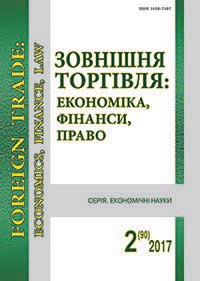Tax regulation as a tool of state environmental policy
Keywords:
tax regulation, environmental taxes, environmental taxation, tax policy, tax system, natural environmentAbstract
Background. Nowadays, attention of the world community is focused not only on financial and economic problems. On the foreground, there are climatic and environmental problems that require search of new and improvement of existing tools, including financial, that will promote their solution.
These tools are taxes, which contribute to solving of urgent environmental problems through regulatory function. They have become an important and effective tool of provision of environmental safety of the society, and play an important role in the transition to low carbon economy.
The analysis of recent researches and publications. A lot of works are devoted to current problems and prospects of development of environmental taxation (ET) in Ukraine and abroad. Despite their availability, regulatory potential of the ET is quite important and little studied topic, and domestic system of such taxation is still quite far from realization of its full potential and effective use.
The aim of the article is justification of the ways of the increase of tax regulation efficiency as a tool of state environmental policy.
Materials and methods. In the process of writing this article a combination of methods and approaches was used, which helped to implement the conceptual integrity of the research, particularly dialectical, historical and structural methods were used for the disclosure of preconditions and specific features of tax regulations use when solving environmental problems of the society.
The results of the research. At present time, there is a growing attention to the use of environmental taxation in the countries worldwide in order to solve environmental problems. The efficiency and effectiveness of tax regulations vary in different countries and is determined by a number of factors: the structure of environmental taxation system (breadth of coverage of objects), the level of taxes (tax rate) and the nature of implementation (benefits), directions of the use of obtained tax incomes. Tax regulation allows payers of environmental tax to choose their own behavior strategy. Tax benefits increase economic interest of pollutants of the natural environment to invest their financial resources into environmental technologies, renewable energy sources. The domestic tax regulation mechanism is not implemented to the full extent when solving environmental problems of the society, because the Ukrainian Tax Code does not contain relevant norms of regulation which are in force in the countries of the European Union.
Conclusion. The essence of tax regulation as a tool of state environmental policy is to influence and correct the behavior of the users of natural resources, pollutants of the natural environment, manufacturers and consumers of environmentally harmful products; to obtain tax incomes that will be used to solve environmental problems and will give an opportunity to reduce the tax load on the capital and labor that will contribute to economic growth, the provision of social and economic development of the society.
References
UN Climate Change Conference Paris 2015. URL : http://www.un.org/sustainabledevelopment/cop21.
Veklych O. Jak zashkodyty ekologichnomu opodatkuvannju? Dzerkalo tyzhnja. 2014. № 32 (178). S. 7.
Ekonomichni aspekty upravlinnja pryrodnymy resursamy ta zabezpechennja stalogo rozvytku v umovah decentralizacii' vlady v Ukrai'ni /za red. M. A. Hvesyka, S. O. Lyzuna. Kyi'v : DU IEPSR NAN Ukrai'ny, 2015. 72 s.
Mishhenko V. S., Makovec'ka Ju. M., Omel'janenko T. L. Instytucional'nyj rozvytok sfery povodzhennja z vidhodamy v Ukrai'ni: na shljahu jevropejs'koi' integracii'. Kyi'v : In-t ekonomiky pryrodokorystuvannja ta stalogo rozvytku NAN Ukrai'ny, 2013. 192 s.
Chala O. A. Suchasni aspekty rozpodilu ekologichnogo podatku v konteksti zabezpechennja ekologizacii' nacional'noi' ekonomiky. Efektyvna ekonomika. 2015. № 3. URL : http://www.economy.nayka.com.ua/?op=1&z=3908.
Roberton C. 2016. Environmental Taxation. NBER Working рaper. № 22303. Р. 5–8. URL : http://www.nber.org/papers/w22303.pdf.
Görres A. 2005. Germany’s ecotax reform 1999–2003: implementation, impact, future development. Green budget paper. Р. 3. URL : http://www.foes.de/pdf/GBGGreenEssay-2005-03-Goerres-Germanys-ecotax-reform-1999-2003.pdf.
Nalogovye l'goty. Teorija i praktika primenenija : monografija / pod red. I. A. Majburova, Ju. B. Ivanova. M. : Juniti-Dana, 2014. 487 s.
The Political Economy of Environmentally Related Taxes, 19 June 2006. Paris : OECD, 2006. Р. 10.
Podatkovyj kodeks Ukrai'ny : Zakon Ukrai'ny vid 02.12.2010 № 2755-VI (zi zmin. i dopov.). URL : http://zakon4.rada.gov.ua/laws.
Europe 2020: A strategy for smart, sustainable and inclusive growth. Communication from the Commission. European Commission. Brussels, 2010, 03 March. 32 p.
Green policies in the EU: A review, EC-IILS joint discussion paper series. № 14. 57 р. The Political Economy of Environmentally Related Taxes, 2006. 19 June. Paris : OECD. Р. 10. URL : http://www.ec.europa.eu/social/BlobServlet?docId=7246&langId=en.
How Effective Are Green Taxes? Green Fiscal Commission, Briefing Paper Two, April 2009. 8 p. URL : http://www.greenfiscalcommission.org.uk/images/uploads/GFC_BRIEFING_2_FINAL.pdf.



